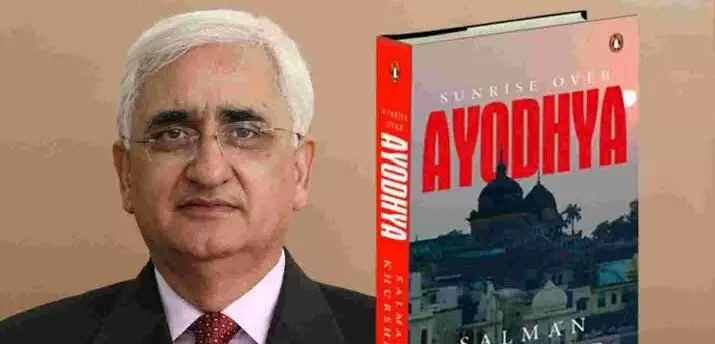
Delhi court refuses to stop publication, sale of Salman Khurshid's book on Ayodhya
text_fieldsThe book 'Sunrise Over Ayodhya: Nationhood in Our Times' written by Salman Khurshid has portions that compares Hindutva to radical jihadist groups such as ISIS and Boko Haram.
New Delhi: Delhi's Patiala House Court on Wednesday refused to stop the publication of a recent book penned by former Union minister Salman Khurshid, comparisons between Hindutva and terrorist groups such as the ISIS and Boko Haram which triggered a major controversy.
ACJ Preeti Parewa, while refusing to grant ad-interim ex-parte injunction, observed that the petitioner Vishnu Gupta, who heads the right-wing group Hindu Sena, failed to establish the 'balance of convenience' in his favour, thus causing the grant of interim relief to be declined.
The Judge has put up the matter for arguments and clarification on the maintainability of the suit on November 18.
"In the opinion of this court, neither a prima facie case nor any exceptional circumstance for grant of ad-interim ex-parte injunction in favour of the plaintiff is made out in the present case.
"Also, the plaintiff has failed to establish that the balance of convenience lies in his favour. Hence, the prayer for ad-interim ex-parte relief is declined at this stage," the judge said.
The court said that the author and publisher had the right to write and publish the book.
"The plaintiff has not been able to establish that inconvenience will be caused to him to avoid the book or alleged 'offensive' excerpts of the book. On the other hand, the injunction would lead to hardship for the publishers and also curtail the right of speech and expression of the author," the court said.
It said that the applicant can always propagate against the book and can even publish a rebuttal to the alleged paragraphs which have hurt his sentiments.
"Also, only a copy of the excerpt has been placed on record and such excerpt cannot be read in exclusion/isolation for interpreting the context in which the said statement has been made," the court noted.
The plea claimed that the book launch event just before the upcoming assembly election in Uttar Pradesh was aimed at polarising and gaining the votes of the minorities in the state.
The plea seeks a prohibitory injunction to prohibit the publication, distribution, circulation, and sale of the book and also ban the book in the larger interest of the society and country























